BTS via Suzie Riemer
Click on images for full view.
Everyone knows Princess Diana—or they think they do. The royal, who would have turned 60 this year, remains a subject of fascination among the public and artists. After capturing Jacqueline Kennedy Onassis’s private struggles following her husband’s assassination in 2016’s Jackie, director Pablo Larraín turned his attention to Diana’s story. His new film, Spencer, offers a fictionalized account of the princess, played by Kristen Stewart, at a turning point during the queen’s annual Christmas holiday at Sandringham House in Norfolk, England. The pivotal three days from Christmas Eve to Boxing Day magnify the many problems within Diana’s personal life. Under surveillance by the Windsors’ retinue of courtiers, trapped in failing marriage, and told to keep up appearances while struggling with an eating disorder, she’s far removed from fairy tales.
Larraín frames his film as a fable, exploring the dark side of the monarchy without eschewing the fantasy and beauty that keeps the system going. Diana’s life may be falling apart, but she looks the part of a princess and is surrounded by luxury. That contrast is part of what makes the film powerful. Creating the wardrobe of the allegorical Windsor meant Larraín, costume designer Jacqueline Durran, and Stewart had to be on the same page. Thankfully, they had some help from a fashion giant: Chanel. “Every step of the way, it was a total collaboration,” shared Stewart via email. “We were all in this together: me, Pablo, Jacqueline, and Chanel. It was so intimate.”
Chanel opened its archives to the production, loaning and re-creating vintage pieces for Stewart to wear onscreen. This level of access allowed Durran to heighten the luxurious mood that Larraín and production designer Guy Hendrix Dyas created. “In terms of style and glamour, the collaboration gave the movie something we wouldn’t have had otherwise,” she says. “The Chanel pieces added to that aura Diana had as a princess, so it was an incredible match in that sense.”
There are thousands of photographs and articles about Diana to draw from, but the wealth of information was a double-edged sword. “In the beginning, it was an intimidating situation because there were just so many images of her,” says Durran, who focused her attention on photos shot between 1988 and 1992. “What I wanted to find was the logic behind her choices and the key pieces you see her wear during that period. Certain elements repeat—color blocking, gold buttons, contrasting lapels, polo-neck sweaters, and high-waist, slightly cropped jeans with flat pumps.” Figuring out Diana’s staples was crucial. “I had to establish a contrast between the formal and restrictive clothes she wears during her official life and the way she dresses when she can be herself,” says Durran. “To tell this story, you had to see a real difference between those clothes.”
To that end Durran used a series of archival gems to achieve both types of Diana’s looks. Stewart wears a striking red tweed coat from the fall 1988 Patrimoine ready-to-wear collection as Diana is mobbed by paparazzi, black velvet dresses from the fall 1983 and 1988 collections, and a slew of vintage accessories. A few modern pieces sneak in too; in one scene, Stewart sports the skirt from look 46 from Virginie Viard’s spring 2020 haute couture collection.
Chanel had a special place in Diana’s wardrobe. A fan of its classic suits and quilted bags, she wore her collection off-duty and while performing her role as Princess of Wales. Stewart found Diana’s outfit selections evocative. “In certain photographs of [Diana], she looks as though someone else dressed her,” she says. “Even if the outfit is beautiful, she seems like a prisoner in it. While doing my research, I noticed that whenever Diana was wearing Chanel, she seemed like herself. When she looked powerful, quite often she was wearing Chanel.” Stewart incorporated the observation into her performance. “When you watch the movie, all the Chanel looks are used when Diana needs help,” she explains. “If the scene was difficult or she felt threatened, we put her in a Chanel suit to give her a bit of a support system. Even if she wasn’t feeling good on the inside, she stood tall and shined during those moments.”
Stewart has some experience wearing Chanel. A brand ambassador since 2013, she’s known for her distinctive take on the brand’s signatures. Though her style is worlds away from Diana’s, she felt the Chanel archival pieces were essential to the story. “If I didn’t have a relationship with Chanel, we would have begged the house to play with their clothes; if we weren’t allowed to, we would have probably mimicked them,” says Stewart. “The character needed them. They’re such a part of her. There is a delicacy and a vulnerability [to the clothes] that makes them even more beautiful. She’s so raw and honest that when she puts them on, you can feel she loves them.”
Unfortunately, many of Diana’s best Chanel moments came after her exit from the royal family, and Spencer’s story plays out during a period where courtiers controlled her wardrobe. “There were all these restrictions to consider,” says Durran. “She wore more Chanel later in life than during the late ’80s and early ’90s.” The royal dress code, which contains rules about everything from hem lengths to nail-polish colors, couldn’t be ignored. Still, when Durran happened upon the film’s pièce de résistance, a strapless gown from Chanel’s spring 1988 haute couture collection, she wasn’t about to change it. “Initially, I was worried we’d have to add sleeves and hide her arms because of the protocols,” she says. “When I had the fitting with Kristen and Paolo in London, she put it on and it was just so great, the perfect look for an extremely glamorous princess. We hadn’t even planned to use it for such a large chunk of the movie, but it was just too good to pass up.”
Adorned with pleated tulle ruffles, an appliqué satin belt, and a delicate frieze composed of fabric florets, the gown was appropriately opulent. Still, after more than 30 years in the archives, the original was far too fragile to function as a costume. “It was too precious—you couldn’t even take it outside,” says Durran. “Thankfully, Chanel came back to us and said they could completely replicate the piece.” It took 1,034 hours—700 devoted solely to the intricate embroidery—to duplicate the couture look. With five seamstresses in Chanel’s atelier working nonstop, they were able to turn the project around in just under a month. “We’re indebted to them,” says Durran. “They had almost no time and were able to recreate every detail. In the end, the only difference was that the new version fit Kristen even better than the first.”
Though it wasn’t the only piece recreated for the film, the couture gown features prominently in the final cut and its poster, which shows Diana crumpled on the ground, her body shrouded in layers of tulle. For Stewart, the couture reflected Diana’s privileged yet unhappy existence. “It’s heartbreaking how gorgeous it was,” she says of the look. “We went through the archives thinking, What is the dress? [And] it was so undeniably the right one. To see someone on the bathroom floor in such a dress is truly heartbreaking. You can’t imagine someone being unwell in a dress [that is] so spectacularly beautiful, unique, and one of a kind. I have such nostalgia for it. Usually, I don’t have an emotional reaction to my movie posters, but every time I see Spencer’s, it makes me want to cry.”
For Durran, helping to facilitate such powerful responses from Stewart was the costume design’s primary role. “My work is supporting her as an actress,” she says. “Watching the final movie was overwhelming because the only thing I wanted was for my work to give Kristen all she needed to achieve her performance. I believed in her so much, and she’s mesmerizing as Diana.”

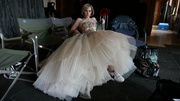
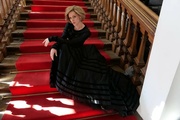
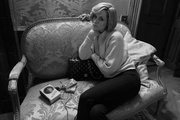
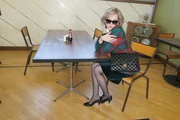
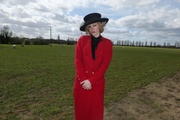
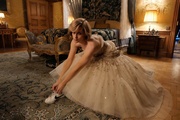
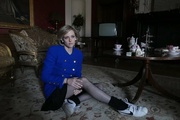
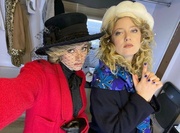
No comments:
Post a Comment
What do you think of this?